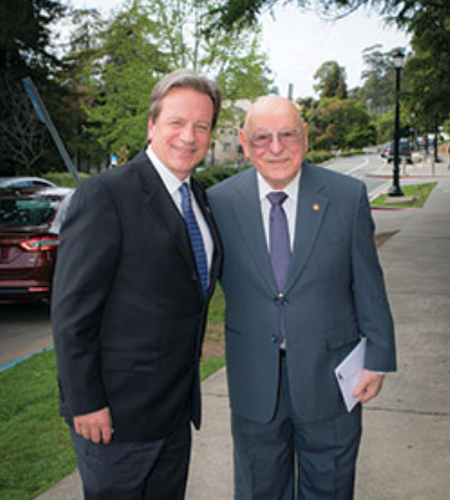Successful Ager: Irving Tragen
A Life Dedicated to Service Unrestricted by Borders
By Kassidy Wade

Irving Tragen has dedicated fifty-five years to foreign service in Latin America. He has profoundly impacted U.S. relations and development in Latin America throughout his career. From his position in aiding the expansion of the World Health Organization in Latin America to his appointment as labor advisor for the Alliance of Progress by President Kennedy, Tragen has committed his life to service.
When reading about successful people such as Tragen, I often ask myself how they accomplished so much. However, after speaking with Irving for an afternoon, it became clear that education, companionship, and commitment were the secret ingredients to his success.
Tragen began his career at UC Berkeley, obtaining his undergraduate and law degrees from the University. As graduation drew nearer, the Dean inquired about Tragen's plans after law school. The Dean suggested that, in light of Tragen’s interest in international relations, he consider specializing in international legal matters, like comparative law. On graduation, Tragen received a fellowship to study comparative law in Chile. Following that fellowship, he received a grant to study comparative labor law in Mexico. Those studies led to a professional assignment in Mexico and thus began a career of public service that included posts in El Salvador, Chile, Peru, Venezuela, Guatemala and Panama as well as Washington, D.C. He was appointed ambassador on assignments while working at the U.S. Mission to the Organization of American States.
Of all his many assignments, those associated with the development programs in Latin America were his favorites. He worked in senior positions in our nation's capital and overseas on U.S. aid programs and believed that the goal of those efforts should be to help countries and people help themselves. Tragen found that money and U.S. aid could only be usefully employed if the recipient Latin American country was committed to the process, built the institutions, and trained the people. These processes were critical to achieving agreed-upon development objectives. He believes that the people in each country must become involved in the development process and championed community participation in planning and executing projects. He believes education is the critical pillar to enabling people to participate effectively and staff public and private institutions. Tragen says that this takes time and makes development a slow process — "generations, not just a few years."
Tragen is focused on community development.

Tragen focused on community development before all else by improving many countries' educational systems. An example Tragen pointed to was the reform of the laws in Chile. He said that only Chileans could make the changes. So, he worked with the University of Chile to create a graduate program in labor relations and facilitated a university-to-university contract with Cornell University to develop a curriculum and train Chilean specialists. The Chilean faculty and specialists would then be able to recommend changes that met Chile's particular economy and environment. Tragen also emphasized the importance of worker skill training and upward mobility for industrial, agricultural, and service workers in the development process and the importance of sustained efforts to improve access to such training. Tragen also assembled the first doctoral program in engineering in Latin America through a partnership with the University of Pittsburgh and the University of Santa Maria. Education was a pillar in Tragen's success, through which he constantly improved himself and empowered foreign communities.
Companionship was another pillar of Tragen's success.
When speaking with him about his published autobiography, he explained how he owed his success to his wife, Ele. The two had been married for fifty-seven years, conquering life and service as one. Ele and Irving first met at Berkeley in the International House, bound by their shared interest in international affairs. Throughout Tragens years of service in Latin America, Ele took many roles to help provide for both of them. Her area of expertise was journalism. Tragen is currently in the process of finishing a novel that Ele had started writing before her passing. Through speaking with Tragen, it became clear that their bond was powerful. I have no doubt that their relationship was fundamental to their success.
Not even retirement can slow Tragen down.
In the past years since his retirement, he has published an autobiography, Two Lifetimes As One: Ele and Me and the Foreign Service, and just recently finished writing a fictional novel this summer. In his free time, Irving enjoys reading and attending activities at his retirement community. Tragen continues spreading his abundance of knowledge through his lectures at UC San Diego in the School of Global Policy and Strategy and the World Affairs Council. Tragen's commitment to education and development has endured for an entire lifetime. He continues to donate and contribute his time to various organizations to improve our society, from research on age-related diseases to improving women's health. Tragen has expanded his service to many causes. Our community will never forget his impact.